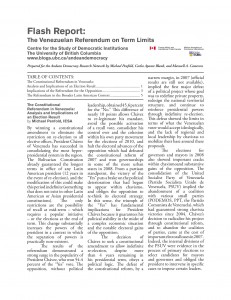On Sunday, February 15, 2009, Venezuelans approved a referendum that modified the country’s constitution, allowing elected officials to run for office indefinitely. This most notably will permit President Hugo Chávez to run for continuous six-year terms, beginning in 2012, when his present term expires. At that time, Chávez will have served as president for 13 years.
According to Venezuela’s National Electoral Council, the referendum was approved by 54.36 percent to 45.63 percent (with 94 percent of the votes counted); almost 70 percent of the electorate went to the polls.
“Si” and “No” campaigns dominated Venezuelan news in the run-up to the referendum. The opposition expressed its fears that passage means Chávez will be president indefinitely, while the president’s supporters underlined that he would need to be popularly elected every six years to do so.
Although numerous countries do not have term limits for their heads-of-state, including many advanced democratic states, this is most common in parliamentary systems. Writing for the Guardian, Maxwell Cameron highlights how the elimination of term limits poses a particular problem in presidential systems, especially in the context of Latin America:
“Presidential re-election is controversial for reasons of both history and institutional design. Historically, Latin American political leaders have tended to concentrate great power in the hands of the executive branch of government. Repeated military interventions in politics throughout the 20th century reinforced the tendency toward overweening executives. A habit of continuity (the term in Spanish is continuismo) developed, in which leaders sought to monopolise all powers while in office. In response, a taboo on re-election emerged.”
The full Guardian article by Maxwell A. Cameron is available here.
Download the Andean Democracy Research Network’s latest Flash Report on the Referendum in Venezuela (PDF) here.

